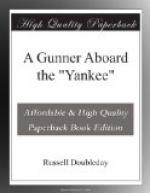The smooth sea was dark and clear as could be, but where churned by the propeller it turned to the color of turquoise.
“I really believe,” said “Bill,” as he joined the group, “that we could use it to turn our whites blue.”
It was a delight and marvel to us all; we would have liked nothing better than to have spent hours gazing at these wonderful colors.
As we stood absorbed in the sight before us, we were interrupted by the short, sharp ringing of the ship’s bell—a dozen or more strokes given in quick succession followed, after a short pause, by two more strokes.
Some one shouted “Fire, boys!” and all hands rushed for their stations—some to the hose-reel, some below to the gun deck to close the ports, and some to the berth deck to receive the hose when it came down. We did not know whether it was drill or actual fire, but the skipper’s talk of the night before gave us unusual energy, and the preparations were made in record time. The canvas hose was pulled along the deck with a swish, the nozzle grasped by the waiting hands below and carried with a run away aft on the berth deck. The fire was supposed to be raging at this point, as was indicated by the two last strokes of the alarm signal.
While the hose was being led out, sturdy arms tugged at the port lanyards and pulled them to. Others battened down the hatches, to keep the draught from adding fury to the flames.
All this was done in less time than it takes to tell it, and the men stood at their posts, perspiring and panting from the quick work.
We had hardly time to catch our breath when the order “Abandon ship” was heard. Immediately there was a scurry of feet, and a rush for the upper deck; but some stayed below to carry ship’s bread and canned meats to the boats—two cases of bread and two cases of meat for the large boats, and one case of each for the smaller. The crews and passengers of each boat gathered near it. Every man had been assigned to a boat either as crew or passenger, and when the order “abandon ship” was given, every one knew instantly where to go for refuge.
Though we had already gone through this “fire drill” and “abandon ship” (one always followed the other), it had then been done in peaceful waters and in a perfunctory way. Now that we were entering “the theatre of war,” we felt the seriousness of it all, and realized that what was now a mere drill might become a stern reality.
The order “Secure” was given; the hose was reeled up, the ports opened, and the provisions returned to their places in hold and store room. The men went to their quarters, and so stood till the bugler blew “retreat.”
The time not devoted to drills was taken up in getting the ship ready for the serious work she was to undertake.
All woodwork on the gun deck not in actual use was carried below or thrown overboard, and the great cargo booms were either taken down and stowed safely away, where the splinters would not be dangerous, or were covered with, canvas.




